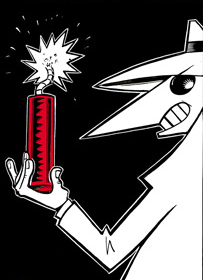A Bad Week for Corporate Spies
 If Cara Schaffer contacts you, be wary. Take emails and online comments from "activist2008" and "stopcorporategreed" with a grain of salt. Londoners, be on the lookout for Toby Kendall, a.k.a. "Ken Tobias." And activists everywhere should think twice before putting documents in the recycling or trash bins.
If Cara Schaffer contacts you, be wary. Take emails and online comments from "activist2008" and "stopcorporategreed" with a grain of salt. Londoners, be on the lookout for Toby Kendall, a.k.a. "Ken Tobias." And activists everywhere should think twice before putting documents in the recycling or trash bins.
Over the past week, reporters and activists outed three different corporate spying operations. As John Stauber and Sheldon Rampton wrote in their 1995 book "Toxic Sludge Is Good for You!": "Movements for social and political reform have often become targets of surveillance. ... The public relations industry has developed a lucrative side business scrutinizing the thoughts and actions of citizen activists, using paid spies who are often recruited from government, military or private security backgrounds."
Last week's revelations show that these underhanded tactics are very much in use today. And they don't just impact the groups being infiltrated. By privileging corporate interests, effectively giving them the first and last word on an issue, they distort vital public debates.

 Clumsy maneuvering by
Clumsy maneuvering by  The Free Tibet Campaign in the UK has warned that "any PR agency that is trying to assist China in its twisted distortion of the truth would be potentially exposing itself to protests outside its offices." Despite this, PR Week reports that
The Free Tibet Campaign in the UK has warned that "any PR agency that is trying to assist China in its twisted distortion of the truth would be potentially exposing itself to protests outside its offices." Despite this, PR Week reports that  In 2004, the
In 2004, the  One of
One of  The Second Circuit of the United States Court of Appeals missed a great opportunity this week to hold the tobacco industry accountable for one of its worst marketing tactics -- positioning cigarette brands in response to smokers' medical concerns. The April 7, 2008, issue of the New York Times has an article about the
The Second Circuit of the United States Court of Appeals missed a great opportunity this week to hold the tobacco industry accountable for one of its worst marketing tactics -- positioning cigarette brands in response to smokers' medical concerns. The April 7, 2008, issue of the New York Times has an article about the